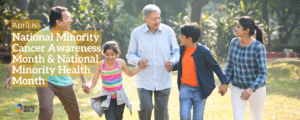
National Minority Cancer Awareness Month & National Minority Health Month
Key Facts
According to the U.S. Department of Health & Human Services and Here to Serve:
- 75% of Blacks, 75% of multi-racial, 55% of Latinos and Hispanics, and 60% of Asian Americans do not have a perfectly matched donor in the worldwide registry.
- It is estimated that over 60 percent of racial and ethnic minority patients over the age of 18 believe it is at least somewhat important to visit a health care provider who shares or understands their culture.
- It is estimated that only 14 percent of the U.S. population has proficient health literacy.
National Minority Cancer Awareness Month
April is National Minority Cancer Awareness Month, and there is no better time to discuss how cancer disproportionately affects minorities. There are differences in the number of new cancer cases and cancer outcomes. Disparities more often negatively affect racial and ethnic minorities, low-income populations, adolescent populations, and young adult populations. “Disparities” are differences in the occurrence, frequency, death, and burden of cancer that exist among specific population groups, including racial and ethnic minority groups.
Cancer outcomes are worse in populations who experience health disparities. This is because diseases from their socio-economic condition affect the treatment and outcomes negatively. Obesity, diabetes, and infections (including Covid-19) all disproportionately impact Black communities. These health disparities can make cancer treatment, including surgery, chemotherapy, radiation, more complicated to do and cause more severe side effects.
National Minority Health Month
National Minority Health Month (NMHM) is a time to raise awareness about health disparities that continue to affect people from racial and ethnic minority groups and encourage action through health education, early detection, and control of disease complications. This month’s theme is Better Health Through Better Understanding.
This year’s theme focuses on improving health outcomes for racial and ethnic minority and AI/AN communities by providing them with culturally and linguistically competent healthcare services, information, and resources. When patients are provided with culturally and linguistically appropriate information, they are empowered to create healthier outcomes for themselves and their communities.
Quick Links
Here to Serve | Minority Cancer Awareness Month
U.S. Department of Health & Human Services | National Minority Health Month
National Institute on Minority Health and Health Disparities | National Minority Health Month

